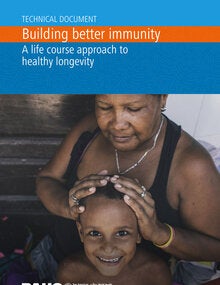As the Americas undergo profound demographic change and there are more persons aged 65 years or older than children younger than 5 years, it is crucial to recognize that national immunization programs must be redesigned to ensure comprehensive protection for individuals across the lifespan. By adopting a life course approach (LCA) to immunization, vaccination programs can be tailored to close immunity gaps at different stages of life. The life course approach foresees the establishment of multiple strategies to reduce missed opportunities for vaccination according to age group. This technical document explains the key concepts of the LCA with a focus on immunization by vaccination, as well as the underlying biological mechanisms that require the application different vaccines at different life stages according to changes to the immune system and in the epidemiological situation of a community. Multiple examples from different vaccines are provided. Finally, this document delivers several considerations for the implementation of the LCA in national immunization programs. This document is part of PAHO’s efforts to introduce the concepts of immunization across the life course to the countries and territories of the Americas and ensure that all persons reap all the benefits that vaccines can bestow. By recognizing the lifelong impact of vaccinations and embracing the LCA, countries can minimize the impact of diseases, enhance the body's resilience during all lifetime, and reduce overall mortality rates. Immunization programs, once primarily focused on early childhood, can evolve into adaptable public health interventions, safeguarding the health and well-being of individuals of all ages.
|

